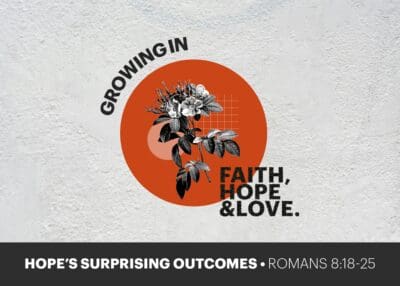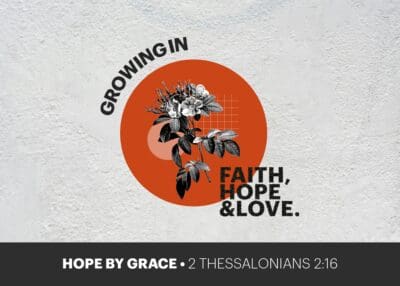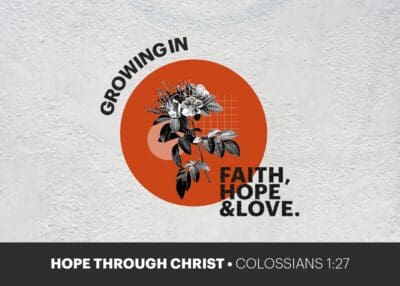“Come, see a man who told me all that I ever did. Can this be the Christ?” (John 4:29)
Please open your bible at John 4. We come today to the marvelous story of how one woman was changed forever by Jesus Christ.
The story
The story takes place in Samaria. Jesus had left “Judea” in the south (4:3), and he was heading for “Galilee” in the north (4:3). We are told that he had to pass through “Samaria” (4:4). That was the most direct route.
Jesus came to a town called Sychar (4:5), and being tired from his journey, our Lord sat down beside a well. We are told that it was the sixth hour (4:6) which was noon, the hottest and most exhausting time of the day.
The disciples had gone into the city to buy food (4:8) so Jesus was alone. Picture a low wall that would have surrounded the top of the well, and Jesus sitting on the ground with his back against the wall, tired after walking many miles.
“A woman from Samaria came to draw water. Jesus said to her, ‘Give me a drink’” (4:7). That was the beginning of a conversation that changed this woman’s life forever!
There is a remarkable contrast between where this woman was at the beginning of the story and where she is at the end. I want us to see the bookends of the story, so we can understand what happens in the middle.
At the beginning of the story, Jesus says, “If you knew the gift of God, and who it is that is saying to you, ‘Give me a drink,’ you would have asked him, and he would have given you living water” (John 4:10). This woman did not know Jesus, and she did not know what God could give her. She had not asked, and she had not received.
But by the end of the story, she is in an entirely different position. This woman goes into the town and begins telling others about Jesus: “Come, see a man who told me all that I ever did. Can this be the Christ?” (4:29).
Not only does the woman come to believe, but on that same day she also becomes the means by which others come to believe! “Many Samaritans from that town believed in him because of the woman’s testimony” (4:39).
But it didn’t end there. “Many” Samaritans from the town of Sycar, who had believed on account of what the woman told them, asked Jesus to stay longer. Jesus stayed for two days and, as a result, “many more believed because of his word” (4:41).
When they believed, the “many more” came back to the woman with whom it all started, and they said to the woman, “It is no longer because of what you said that we believe, for we have heard for ourselves, and we know that this is indeed the Savior of the world” (4:42). That is as clear a statement of faith in Jesus as you could ever hope to hear.
This is a remarkable transformation! A woman who does not know Jesus, does not know what God could give her, has not asked of or received anything from God—in a single day—becomes a woman who has been so captivated by Jesus Christ that she speaks to others whom she has known her entire life with freedom and joy about what she has found in him, and becomes the means by which many people come to know the Savior of the world!
The question I want to ask today is: How did this come about? How did Jesus reach and win this woman to faith in himself? How did this remarkable change come about for her?
Some of you will relate to this woman: You are where she was. You also are trying to figure out what grace is, and who Jesus is, and how you can receive what he has to offer. This is a marvelous story that is full of hope for you. It shows you what Jesus Christ can do in the life of a person who starts out far from faith, far from hope, and far from joy.
Some of you know a person like this woman. You have a friend, a neighbor, a colleague, or a member of your extended family who does not know Christ and does not know what God is able to do in his or her life. And you wonder, How can I reach them? Jesus gives us the most marvelous model and example in this story.
Where Christ Finds Her (The Barriers to Faith)
This woman was about as far from faith in Jesus as it is possible to imagine. There were multiple barriers that make her seem an unlikely candidate to become a follower of Jesus. The first of these was race.
1. Race
The Samaritan woman said to him, “How is it that you, a Jew, ask for a drink from me, a woman of Samaria?” [For Jews have no dealings with Samaritans]. (John 4:9)
This lady was not drawn to Jesus. We don’t know the tone with which the words of the Bible were originally spoken, but I imagine in my mind that her first words to Jesus were words of utter contempt.
The history of tension, and at times of hatred, between the Jews and the Samaritans was well known in the ancient world. Seven hundred years before the birth of Christ, the Assyrians had taken into exile conquered Samaria, the Northern Kingdom of Israel.
Most of the people were taken into exile, and only a few people were left in this deserted land. The Assyrians then brought people from various other countries to settle in Samaria and repopulate the region. This was often done in ancient times. You moved people groups around as a way to control them.
So the people of this area were of a mixed racial background and of a mixed religious background. We read about this in 2 Kings 17:33 where we are told: “They [the people of Samaria] feared the LORD but also served their own gods, after the manner of the nations from among whom they had been carried away” (2 Kings 17:33). In other words, Samaria was a religious melting pot.
Many of you did not grow up in Christian homes. You may have grown up in a family that was Jewish, Muslim, Hindu, or Buddhist. The Bible was not your book. It was a book that belonged to others, and growing up you may have felt that the others to whom it belonged were not very likely to be your friends. If you grew up with other gods, you may feel that it’s not in your background, and that you are a long way from Christian faith. I want you to see that this was precisely the situation of this woman.
2. Religion
“Our fathers worshiped on this mountain…” Jesus said to her… “You worship what you do not know.” (John 4:20, 22).
This woman was not without religion. This lady had a religious tradition. “Our fathers worshipped…” She has some knowledge of the truth. And she says in verse 25: “I know that Messiah is coming.”
But what good had her religion done for her? She did not know God—she worshipped what she did not know (4:22). She did not know what it was to ask and receive from God (4:10). She had a religious tradition, but it had not been a source of joy or satisfaction or peace or life to her.
Thinking about this, my mind went back to my days in high school in Scotland. The school that I went to had a “Christian” assembly for worship every morning. Every morning we all filed into the great hall with its ancient wooden benches. We all stood when the Headmaster and the deputies walked onto the platform with the chaplain.
Then the music master would strike a tune on the great organ for a hymn that nobody sang, except for the chaplain, a rather large man who made a gallant effort, though even he seemed embarrassed bit it all. Then we had a prayer, a reading from the Bible, and the announcement of names of the students who were to report to the headmaster to be disciplined! That’s what we did every day.
Hundreds of students were experiencing the deadening effect of compulsory worship! It was like giving them an inoculation that would make many of them highly resistant to anything to do with Christianity—worship, prayer, or the Bible—for the rest of their lives. Many would spend the rest of their lives assuming that there is nothing there for them.
Some of you may be have known a formal kind of religion that never brought any life, joy, or power. That was the position of this woman. A. W. Pink says, “She did not know the gift of God. The language of grace was an unknown tongue.” [1] It was a foreign language to her.
3. Record
“You have had five husbands, and the one you now have is not your husband.”
(John 4:18)
Think about the immense sadness of this woman’s life. Her personal history had been a story of broken relationships. Think of all the joy of a wedding and all the anticipation of joy. Five times she had married with all the hopes of happiness that accompany every wedding. Five times it had ended in disappointment. Now she was living with a man who did not want to marry her.
In any society, having five husbands would be unusual, but in the ancient world it would have been unusual in the extreme. That may be why there was so much interest in the town when this woman told her story: “Come see a man who told me everything I ever did!”
“Well, a stranger who knows everything you have ever done must be quite remarkable—let’s go and meet him!”
I suspect that her own life story might have led her to a place of thinking, “Why would God be interested in me?” But here’s what I want us to take in today: Jesus crosses every barrier in order to reach this woman, who seemed about as far away from faith in Jesus Christ as it would be possible for a person to be. He has to go to Samaria, because the Father has an appointment for him that is going to change an entire town.
How Christ Wins Her (The Path to Faith)
What does the path to faith in Jesus look like for someone who starts out far away?
1. Hope
“Whoever drinks of the water that I will give him will never be thirsty again. The water that I will give him will become in him a spring of water welling up to eternal life.” (John 4:14)
Notice where Jesus begins this conversation: There are great thirsts in your soul—a sense of looking for something more than you have found in your life—a sense of longing, hungering, and thirsting.
Jesus speaks of “a spring of water” that is a source of joy and satisfaction. Jesus gives this water: “The water that I will give him…” This source of joy and satisfaction can actually be in you: “in him.” And this joy and satisfaction that Jesus gives will never end: “it will become in him a spring of water welling up to eternal life.”
Notice that Jesus speaks to this woman’s thirsts before he confronts her sins. Our Lord approached different people in different ways, and where people were arrogant he often approached them quite differently, but I think it is significant that with this woman, who is far from the truth, he does not begin with her sins but with her thirsts.
No one turns from their sins unless they have hope of something better. So Jesus begins by laying out the better that lies ahead. The prodigal son said, “I will return to my father; perhaps he will make me one of his hired servants” (Luke 15:18, 19, author’s paraphrase).
If the prodigal son had known that when he returned, the father would run to meet him, put a robe on his back, a ring on his finger, and kill the fattened calf for a meal to celebrate the son’s return, he would surely have come back sooner!
Giving up your sin becomes possible when you know what God has in store for you. When you know that God’s grace is waiting for you, you will feel free to confess your sins. Otherwise, you may just hold onto it. When you know that forgiveness is there for you, you will be drawn to return to the Father.
Change always begins with hope, and there is marvelous hope here! Your life can be more than it has been! There is a joy and satisfaction that can be yours. Jesus Christ can give this joy to you and he is ready to do so.
2. Candor
Jesus said to her, “Go, call your husband, and come here.” (John 4:16)
I use the word “candor” here because this is the moment when the conversation becomes intensely personal. The woman says to Jesus, “Sir, give me this water, so that I will not be thirsty or have to come here to draw water” (4:15). I don’t think she really understood what Jesus was talking about, but her interest is engaged and she wants to know more.
I love the gentleness of Jesus here. If the woman is to receive anything from Jesus, she has to get to the place of being open and honest with him. Jesus helps her to get there by saying, “Go, call your husband.”
She says, “I have no husband.”
Jesus replies, “You are right in saying, ‘I have no husband’; for you have had five husbands and the one you now have is not your husband” (4:17-18). It is clear from this that living together as husband and wife with someone who is not your husband or wife does not honor God.
The woman says, “I perceive that you are a prophet” (4:19). A prophet was a person who was given knowledge by God of something hidden that could not otherwise be known. Nathan was a prophet and he spoke to David about his sin of committing adultery with Bathsheba. The adultery was hidden, so what did God do? He revealed it to the prophet and the prophet confronted David. At this point, the woman is thinking: Jesus is a prophet. He can see through me, and he knows everything about me. I need to be careful here.
Jesus Christ knows everything about you. He is the One before whom all hearts are open and from whom no secret is hidden. Thank God Jesus is more than a prophet. He came not only to tell us our sin, but to save us from sin: “You shall call his name Jesus, for he shall save his people from their sins (Mat. 1:21).
Jesus has made here aware that there are things in her life that are not right, and that need to be put right. With her conscience awakened, the woman wants to know what she can do. “Our fathers worshiped on this mountain, but you say that in Jerusalem is the place where people ought to worship” (4:20). Some commentators think that the woman says this as a distraction to get the conversation away from her own situation, but I don’t think so. I think that she sees her need and she wants to do something about it.
Jesus has awakened her conscience, and so she says to him: “All right Jesus. You are telling me that I have not lived the life that God is calling me to lead. You are telling me that the life I am living now does not honor him. OK, I get it—my life is not as it should be.
Now what can I do? Where do I find God, and how can I put this right with him? Can I offer a sacrifice here, or are you telling me that I need to go to Jerusalem? Where do I find God? How can I seek him?” I think that’s what she is saying, and that’s a good response.
Our Lord’s answer is very wonderful. “You are asking about how you can seek after God. The good news is that God is seeking after you!”
3. Calling
“The hour is coming, and is now here, when the true worshipers will worship the Father in spirit and truth, for the Father is seeking such people to worship him.” (John 4:23)
Notice the shift in categories: The woman wants to know what she can do: “Where is the right place to offer a sacrifice?” But Jesus answers, not in terms of what God wants her to do, but of what God calls her to become!
God is looking for people who will worship him in spirit and in truth. What does that mean?
- To worship “in spirit” means to worship from the heart—to love God with all your heart, soul, mind and strength, to find your joy, your hope, and your peace in him.
- To worship “in truth” means to worship through the one true way of access to God (through Jesus himself). He said, “I am the way, and the truth, and the life” (John 14:6). “It is through me that you become the kind of worshipper the Father seeks.”
True worshippers worship the Father in spirit and in truth. I have never heard a better definition of worship than this one from William Temple:
Worship is the submission of all our nature to God.
It is the quickening of conscience by His holiness;
The nourishment of mind with His truth;
The purifying of imagination by His beauty;
The opening of the heart to His love;
The surrender of will to His purpose. [2]
The Father is seeking such people. The woman has not yet realized who Jesus is. She still regards him as a prophet, and so what she hears is an impossible command: “You have to become something that you are not!”
Formal religion is easy—make a confession, say a prayer, offer a sacrifice—but how is this woman to become the kind of worshipper God seeks? How can you become a person who loves God from the heart, and finds your peace and joy and hope and satisfaction in him?
The question has moved from where to how? How do I become what you say? I don’t have the capacity to do that. Maybe what Jesus describes here seems beyond you? I think that’s what the woman was feeling, so she backs off. She says, “I know that Messiah is coming… When he comes, he will tell us all things” (4:25).
“It has been nice talking with you, Jesus. What you have said is very interesting to me, and I certainly need to think about these things more. But it’s all a bit beyond me right now. I have a home to clean and meals to cook. But maybe one day, someone will come who can help me to become what God calls me to be. They say that’s what the Messiah will do when he comes.”
Jesus says, “I who speak to you am he” (4:26). “I am exactly the one who came to do for you what you cannot do for yourself.
The great question is not where you worship, but how you get a heart that really loves God and worships him in spirit and in truth. Jesus says, “That’s what I can give you! That’s what I was talking about when I spoke of ‘living water’ welling up in you to eternal life.”
Jesus Christ can do more for you than any prophet. A prophet may be able to tell you your sins. Jesus can change your heart. He can create in you a new heart that loves God, so that you begin to worship him in spirit and in truth.
Jesus Christ is the One who can:
Quicken your conscience by his holiness;
Nourish your mind with his truth;
Purify your imagination by his beauty;
And open your heart with love, so that as a result,
you will freely and gladly surrender yourself
in ever-increasing measure to his purpose.
Here is this woman face-to-face with the Savior of the world. And she realizes: Before me right now is the One who can make me into the person that God is calling me to be!
The Father is seeking true worshippers who will worship him in spirit and in truth
Perhaps today you have sensed God speaking to the deep thirsts of your soul, reaching out to you in love, offering you hope and a new heart. Does that describe you? The water Jesus gives can become in you a spring of water welling up to eternal life.
“If you knew the gift of God, and who it is that is saying to you, ‘Give me a drink,’ you would have asked him, and he would have given you living water” (John 4:10).
Well, after looking at what Jesus says here, you do know who Jesus is, and you do know the gift that God offers to you, so why would you not ask him? Come and ask and receive, and say to him: “Oh, God, I am so far from being the kind of worshipper that you seek. Send your Son to make me this kind of worshipper today.”





